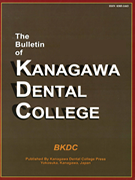- HOME
- > 一般の方
- > バックナンバー:The Bulletin of Kanagawa Dental College
- > 38巻1号
- > アブストラクト
アブストラクト(38巻1号:The Bulletin of Kanagawa Dental College)

English
| Title : | Does Chewing Facilitate Human Cognitive Function? |
|---|---|
| Subtitle : | BKDC CLINICAL AND RESEARCH TOPICS |
| Authors : | Yumie Ono |
| Authors(kana) : | |
| Organization : | Department of Physiology and Neuroscience, Kanagawa Dental College |
| Journal : | The Bulletin of Kanagawa Dental College |
| Volume : | 38 |
| Number : | 1 |
| Page : | 43-44 |
| Year/Month : | 2010 / 3 |
| Article : | Report |
| Publisher : | Kanagawa Odontological Society |
| Abstract : | Accumulating evidence in rodents has shown that masticatory stimulation maintains cognitive function. Reduced mastication attenuates cognitive function, especially hippocampal-dependent learning and memory abilities, and active mastication under stressful condition relieves systemic stress responses to ameliorate stress-attenuated memory process. In several psychological studies using human subjects, it has also been shown that gum chewing improves some cognitive functions, such as the score of immediate or delayed word recall, the sensitivity index of spatial working-memory (WM) tasks, and reaction time in numeric WM tasks. A recent fMRI study further revealed that the enhancement of cognitive performance after gum chewing is associated with BOLD signal increases in the WM-related brain regions during n-back tasks. However, precisely how chewing affects WM acquisition to enhance cognitive performance still remains to be clarified. We therefore used Magnetoencephalography, the high time-resolution, non-invasive measurement of electrical activities in the cerebral cortex, to investigate the effect of chewing on maintaining memory acquisition during WM tasks. |
| Practice : | Dentistry |
| Keywords : |
